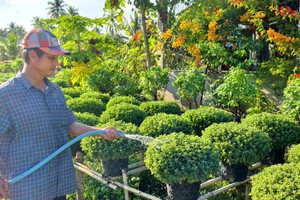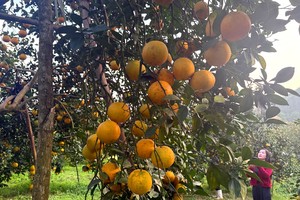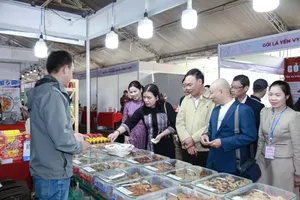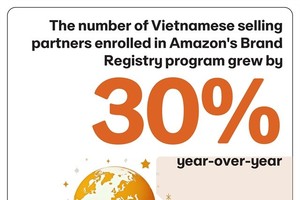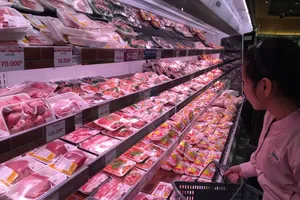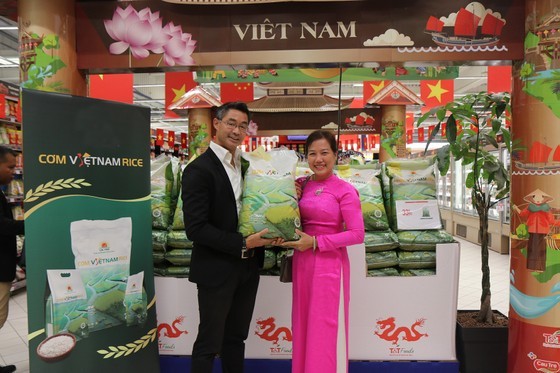 |
Vietnamese -grown rice is displayed in European countries |
Potential markets
When India, which is the world's largest exporter of rice, announced a ban on exporting non-basmati white rice in a bid to calm rising prices at homes and ensure domestic food security in July, it created momentum for Vietnam's rice exports to surge. Many businesses have taken advantage of this opportunity to not only increase output but also the value of exported rice.
Vietnamese-branded rice has been displayed in supermarkets in major markets such as the United States, Europe, Japan, and Korea. Distribution systems of Singapore, Japan, Australia and the United States show that the price of Vietnamese branded packaged rice ranges from US$1,600-$1,800 a ton, much higher than raw exported rice at only about $500-$600 per ton, General Director of Loc Troi Group Nguyen Duy Thuan. As a result, in the first 9 months of 2023, the Ministry of Industry and Trade said rice exports reached $3.66 billion, an increase of 40.4 percent.
Not only rice but many precious medicinal herbs such as ginseng, Ngoc Linh ginseng, cinnamon, anise, Panax notoginseng, and Lai Chau ginseng also have great export value. For example, cinnamon and anise products have an export value that increases rapidly each year and is estimated to reach $300 million by the end of this year.
Vietnamese Commercial Counselor in the United States Do Ngoc Hung said that Vietnamese cinnamon and anise are currently being used quite commonly in products with high added value such as essential oils, foodstuff, cosmetics, functional products, and coffee in the US market. The export turnover of cinnamon and anise to the US market reached $50 million accounting for 35 percent of the country's total cinnamon and anise import market share.
Another potential market is the export market for Halal food - food deemed permissible under Islamic law. According to assessments, the global halal market is estimated to grow to $7,000 billion and is expected to increase to about $10,000 billion before 2028. The Halal product market is widely distributed around the world with hygiene criteria of food safety, quality and environmental protection. Vietnamese businesses are considered to have many advantages in exploiting the Halal market because it is one of the largest agricultural and aquatic product exporting countries in the world, said Director of the Center for Investment and Trade Promotion in Ho Chi Minh City Tran Phu Lu.
Vietnam is oriented to deep processing
Market potential is diverse, but Vietnamese agricultural products are mostly exported as raw materials. According to Mr. Tran Phu Lu, the reality of food export by businesses into the Halal market is just the beginning of exploration. Every year, our country has about 50 companies certified with Halal products
The key products are seafood, beverages, canned foods, confectionery, vegetarian foods and pharmaceuticals. Therefore, businesses need to proactively accelerate production transformation, approach new standards and constantly innovate products to keep pace with consumer trends that are changing every day in the market.
Meanwhile, Vietnam Trade Counselor in India Bui Trung Thuong said that in India, cinnamon and anise products account for 80 percent of the country's import turnover. However, because it is an export of raw materials, instead of being able to dominate the market, on the contrary, import partners forced Vietnamese businesses to decrease prices. Therefore, if Vietnam's agricultural and medicinal resources are processed into refined products with Vietnamese brands, it will not only increase value but also have the ability to dominate the export market. Besides, businesses that have developed the market must maintain the market. To do that, it is necessary to pay attention to the secrets of product processing technology.
A representative of Huong Viet Xua Company said that in the past, many Vietnamese products were imported by India, China, Thailand, and Korea such as salted roasted cashews, cinnamon essential oil, and spices of all kinds but up to now, these products are rarely exported to the markets of these countries because their own enterprises have produced them themselves.
Many businessmen from other countries have returned to invest in domestic factories after studying in Vietnam. Some of them even opened a plant in Vietnam to produce and export back to their countries, competing directly with Vietnamese businesses.
According to the Ministry of Industry and Trade, in the first 9 months of 2023, agricultural products are a product with stable export turnover, reaching more than $19 billion, an increase of 16.7 percent over the same period last year. With this growth momentum, agricultural products are assessed to contribute positively to the recovery of the economy.




